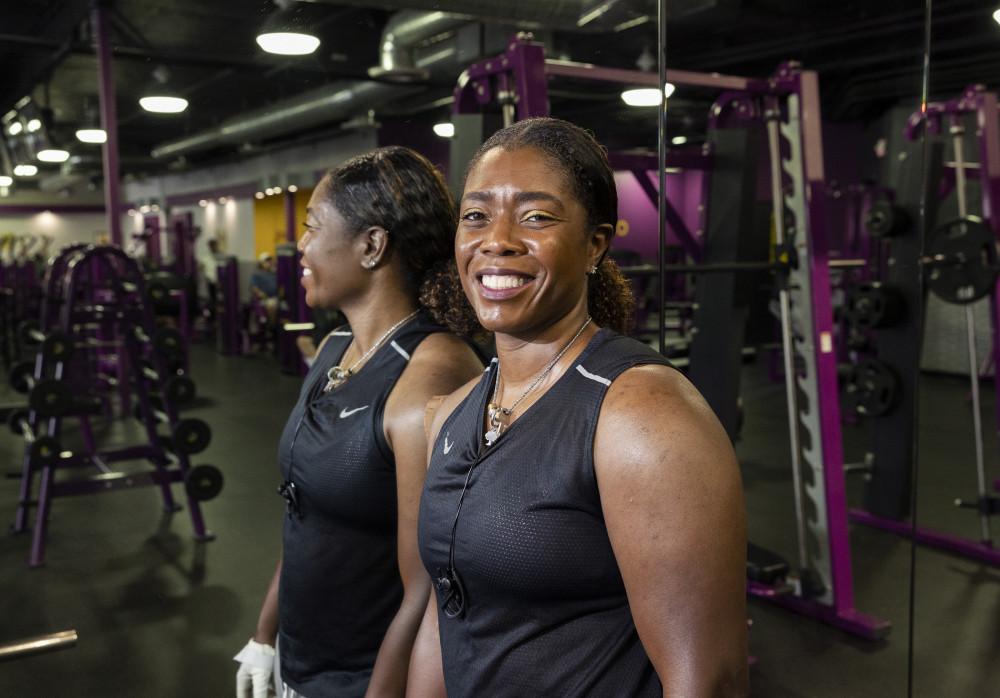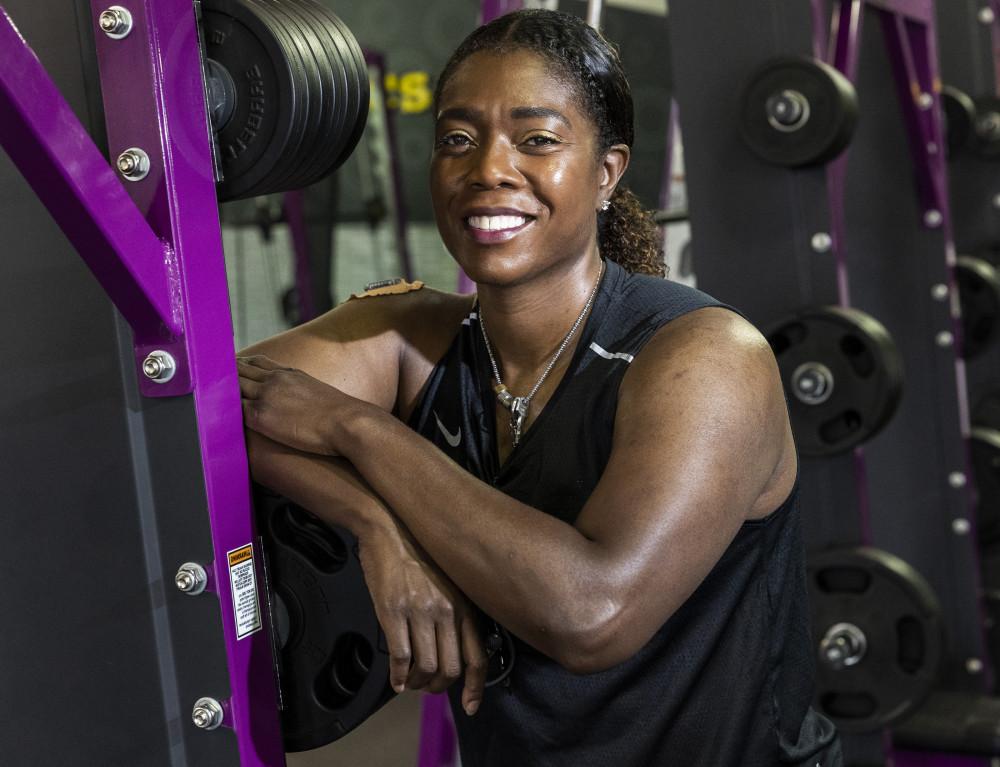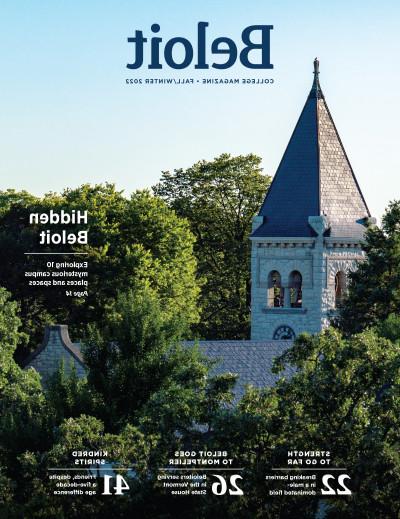The Strength to Go Far
As a trainer, Shaakira Hassell’00 pushes athletes beyond what they can see.
In many ways, Shaakira Hassell’s professional career mirrors her Beloit College experience. Despite obstacles, she has persevered to succeed.
As a strength and conditioning coach in a field largely dominated by white men, she has endured sexism and racism to follow her passion. That determination has led to a six-year stint leading the U.S. Coast Guard Academy strength and conditioning program, training work with military special forces, and a 2018 fellowship with the NFL’s Carolina Panthers.
“I’ve been steadfast with my beliefs because of how much I care for my athletes,” Hassell says. “When I train, we both learn from each other as the whole person. That’s not just mental and physical but also spiritual. I care about what my athletes do when they’re not in the weight room. I care about their life and their family or how their schoolwork is going. That strengthens our relationship to the point where we grow together.”
The seeds of that holistic approach began when Hassell, class of 2000, self-designed her interdisciplinary sports science major during her junior year. She had enjoyed an athletic training class and jokingly now says she knew she couldn’t pursue becoming a sports science doctor because she didn’t want to take genetics.
“But I knew I always wanted to be tied to sports in some way,” she says. “And I knew after taking the athletic training class that I didn’t just want to see my athletes when they were hurt.”
Designing her own major helped create a focus that, up to that point, had eluded Hassell in her Beloit experience. She was recruited out of Chicago to play basketball, but a coaching change and torn Achilles derailed that experience after her sophomore year. She occasionally struggled not to feel isolated.
But a connection with Cecil Youngblood, then the men’s basketball coach and now dean of students, proved fortuitous.
“Cecil told me about strength and conditioning and said, ‘Not only will you see your athlete when they’re hurt, but you’ll be the one to help prevent them from getting hurt. And you’ll have them year-round.’ That intrigued me,” Hassell says. “I was a behind-the-scenes person anyway. So I knew I didn’t want to be an Xs and Os coach.”
Youngblood says he merely offered advice to channel strengths that Hassell already possessed.
“I gravitated to her because I could kind of see she was struggling,” Youngblood says. “She had made the effort to be where she was, she just couldn’t find the pathway to make herself comfortable. We bonded over her wanting to learn more, to get stronger, to help her be a better athlete.
“What I noticed about her from the beginning was that she was stubborn and wouldn’t be intimidated. She was going to find her way.”
Hassell did exactly that. She also credited connections with classmates and former Beloit administrator Natalie Cepeda, biology professor Marion Field Fass, and dance professor Chris Johnson.
“At Beloit, I learned a lot about life,” she says. “I learned a lot about how to handle people. I learned a lot about myself.”

As part of designing her own major, Hassell applied for a study abroad program to attend right after graduation in Australia, a country at the forefront of sports and exercise science. While there, she tried out for the Melbourne Tigers, a powerhouse professional basketball program.
Impressively, this is one of two professional athlete lines on Hassell’s résumé. On a whim, she also tried out for — and made — the Chicago Force and Atlanta XPlosion of the Independent Women’s Football League. Her Atlanta team won the 2006 IWFL championship.
This newfound love for football is why Hassell attended both Georgia Southern and Valdosta State University in Georgia as she pursued her master’s degree and worked as a graduate assistant strength and conditioning coach.
“Being in the South and in a male-dominated field, Georgia Southern wasn’t going to let me train football,” Hassell says. “They fired me by December, told me not to come back.”
Hassell returned anyway — did we mention she’s stubborn? — to finish the academic year before attending Valdosta State. With her graduate degree in hand, she landed her first full-time job as Troy University’s assistant strength and conditioning coach in Alabama where she worked with — what else — the football team, among others, while securing another master’s degree, this one in sports administration.
When that run ended in 2011, she worked in private practice for IMG Academy and served a two-month stint as tactical strength and conditioning coach at Fort Bragg, training military members. A colleague at Fort Bragg landed a job coaching basketball at the Coast Guard Academy and put Hassell in touch with the athletic director.
Hassell found a home.
“I got hired as their head strength and conditioning coach,” Hassell says. “I got along from the first day with the football coach, Bill George. I told him, ‘If you have problems with me being a female leading your men, then we need to talk about this right now. Because I’m here to stay.’ He laughed and said, ‘My guys are your guys. I trust you will do what you need to do to make them better.’”
During Hassell’s nearly six-year run at the Coast Guard, she also landed the prestigious Bill Walsh NFL Diversity Coaching Fellowship and worked the Carolina Panthers’ 2018 training camp.
Hassell jumped all in throughout the experience, soaking up any bit of information or knowledge she could find. She worked with the sports nutritionist to learn how to dispense players’ supplements pre- and post-practice. And the Panthers placed her in charge of working with injured athletes during practice and at different stations in the weight room for the entire team.
“It was beyond my wildest dreams. That whole experience was mind blowing,” Hassell says. “They didn’t make it seem like they wanted to teach me. They made it seem like they wanted me to come and help them. They weren’t micromanaging me. They said they trusted me to help.”
At the time, the Panthers even featured Mario Addison, one of Hassell’s former football players from Troy, which was her first full-time job.
“I’ve never had one bad experience with any of my athletes in 16 years in the field, regardless of the sport they played,” Hassell says.
This speaks to Hassell’s care factor and commitment to her holistic approach — even if she has occasionally had to overcome racist and sexist barriers to implement it.

Hassell is currently pursuing her Ph.D. in health sciences and exercise and sports science at Liberty University while also working as an independent contractor for the military and government. The business she created is called Go Far! Government Services.
That’s the same phrase Hassell uses to break huddles on the sideline or in the weight or training room with her athletes. It’s a reminder that no matter her next career move — her goals include working with military special operations forces, or an NFL job, or becoming the first Black female to head strength and conditioning at a Big Ten university — her focus always is on pushing her athletes to achieve beyond what they can currently see.
“This is what makes me happy,” Hassell says. “Motivating people to do better and to want to do better and getting them to realize that they can be better than they were the day before, that’s what pushes me.”
K.C. Johnson’89 covers the Chicago Bulls for NBC Sports Chicago. He spent 29 years at the Chicago Tribune, covering two Olympic Games and 23 Bulls’ seasons.


